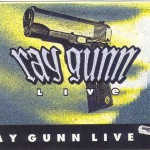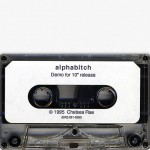 Alphabitch
Alphabitch
Advance Tracks
Self-Produced
Since she organized the Mia Zapata Benefit back in March, fortunes have changed drastically for Chelsea Rae and Alphabitch. Since then, the band has found a benevolent backer, the original drummer and lead guitarist have rejoined the fold and they have begun recording their first full length CD.
These advance tracks are the first five (of an eventual twelve) songs the band has recorded with notorious producer Barrett Jones. Jones is known to have been involved on several early Nirvana projects, as well as some work with Dave Grohl since. Alphabitch recorded these five cuts in April at Jones’ Laundry Room Studios in Seattle. And they are returning to Seattle in July to record the remaining songs at Bob Lang Studios, where the likes of Bob Watt, Candlebox, Nirvana and Afghan Whigs have done work.
While three of these five tracks were reviewed in these pages a couple of months ago– these are new, improved recordings with the new/old, re-energized Alphabitch. And that makes all the difference. For, Alphabitch seem right on the verge of something big.
The addition of Jeff Faulkner on guitar and Scott Cuthbert on drums is readily apparent from the start. The new song, “No Pain,” demonstrates the band’s tougher, more aggressive sound. Over Chelsea’s rasping wail, Faulkner adds jangling chord fills and strident bent note figures, while drummer Scott Cuthbert (ex-Everclear) falls in perfect synchronization with long-time bassist Brian Casey. It’s a hot cut that finds room to breathe– sometimes smoldering, sometimes bursting into flame; a song that clearly defines the band and its musical turf.
The new version of “Bad Girl” absolutely seethes with intensity; ripping through the lead segments with a surging Smashing Pumpkins-like tsunami of sound. In the verses, a vague Latin feel invades the cut-time– as Chelsea wails with a low, husky vibrato. The choruses churn beneath Chelsea’s mean-assed attitude– she absolutely disgorges the words– “Poor girl/White girl/Bad fucking girl/Don’t ask who I am/I’m leaving as soon as I can/I’m fucking insane and that’s how this will end/Don’t bring me back in,” as if she were spitting out a mouthful of carbolic acid.
The remake of “Me and Everybody Like Me,” benefits greatly from Faulkner’s snarling, twisted fills and masterfully poignant solo, and Cuthbert’s indomitable drum-work. And the hit song “Psalms (Hallie’s Song)” is given the raucous, unbridled treatment it always wanted. Cuthbert and Casey are constantly pushing the beat, throwing this number into a full sprint, while Faulkner pulls off a fine re-creation of early Pretender James Honeyman-Scott.
The final track, a new one, “Ugly,” is the best of all. Neatly walking the tightrope between a lulling ballad in the verses and a full-throttle rage in the choruses, Chelsea chimes in with the clever couplet– “Nice to see that you’ve gone/Chew it up and spit it out on the lawn/ I felt ugly today/Long before you had anything ugly to say.” Casey’s bass bubbles up, carrying the verse along like a soft whirlpool into the maelstrom of the chorus.
While this recording is not an official release, the band will have cassette versions on sale at their infrequent live shows this Summer. Chelsea Rae and Alphabitch have created a sound that has its’ antecedents in the work of Patti Smith, Marianne Faithful, Chrissie Hynde and Johnette Napolitano. It’s a tougher sound than those of most fem led bands one hears today. Rather unique. And that should be the ticket for the band to reach the huge success for which they seem destined.
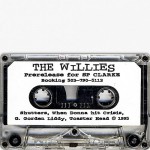 The Willies
The Willies
Pre-Release
Ten Ton Records
The Willies have recently completed work on their highly anticipated second CD, Jefferson’s Last Dead Show— which is due for release this Summer. It’s been four years since the Willies first emerged onto the scene, garnering critical high praise (Willamette Week proclaimed them to be Best New Band in 1991) and a loyal following. And the 1992 release of their first CD, Get gave ample proof of the band’s aptitude and ingenuity.
The propitious addition, last year, of new bassist John Wager (identified in promotional material as John Bruce), helped immeasurably to solidify the rhythm section– which was at one time their lone weak spot, and now is one of their myriad strengths.
And all those strengths are given free rein on the four songs included in this preview recording. For, if this country cared about such honors, the Willies would be proclaimed “America’s XTC” or “The New Talking Heads” with utter and complete accord. Each of their songs is like a mini-movie, where one is unwittingly swept into the scenario. Eric Levine’s idiosyncratic vocal delivery can hypnotize the listener with his incessantly pithy stream of unconsciousness– paraphrasing Shakespeare in one instance and Otis Redding in another.
Okay, so obviously the task of presenting intelligent rock is Sisyphus-ian by nature– but the Willies move from funk to grunge with such facility, you’re not always aware you’re being intellectually challenged. Still the Willies’ is nothing if not an educational display of smarts.
And the Willies have come a long way from the 8-track induced production headaches of Get– to a splendorous 24-track spread at Blue Dog Studios, with this recording. The instrumentation is luxuriant without being excessive, the arrangements adventurous and unusual. Check out the characteristically odd love song “Shutters.” An odd harmony vocal accompanies Levine, which is either an electronically derived chipmunk or Deb Talan, of Hummingfish, one can’t be sure.
“Donna Hit Crisis” is a Willies’ staple that is given a snappy soul-horn treatment over witty lyrics– “When Donna hit crisis and burned down the bedroom/ Her poster of Sting and her potpourri thing/ Were found by a traveling bum/ On a long, long road.” The horn section reappears on the funky soul send-up of “G. Gordon Liddy.” Don’t miss the superlative duet between lead guitarist S2 Carpenter and guest violinist Béla Balogh in the first solo break– at first a short call-and-response section segués into a unison piece so seamless and strange in composition as to be mind-boggling. Carpenter’s second solo is a muted horn-like wah-wah solo that would intimidate Skunk Baxter. Tina Purdy’s backup vox in the choruses and turn arounds are solid and gutsy.
Colin Colebank sets the mood for “Toaster Head,” with an intricately laid-back little intro. The song builds in intensity to where, at the chorus, it’s a full blown rocker. And hey gang, wanna hear a series of guitar solos Jimi would die for (had he not already died)? Check out S2’s inspired work in the middle of this song. It’s like the experience of a freight train going by– in side your head.
If these four tracks are any indication, Jefferson’s Last Dead Show can be expected to be a complex compendium of styles, embroidered with judicious threads and ornate filaments, without seeming in the least pretentious or over-done. The Willies have their chops and musical sensibilities together and they deliver an astute, humorous array of oddly compelling songs with taste and aplomb. Bingo.
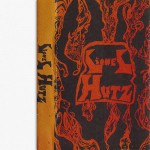 Lionel Hutz
Lionel Hutz
Lionel Hutz
Self-Produced
Zu Leika. Remember that name. Yes, her name sounds like that of a Russian space dog or a Norwegian folk heroine, but remember her name. Any further questions as to whether women can rock or play lead guitar can, henceforth, be referred directly to Zu. Chunky power riffing, searing leads and tasty licks– she’s got ’em all down cold. Not an imitation, but the real thing.
Zu fronts Lionel Hutz, a tight and punchy three-piece. Her songs are smart and funny (check out the logic of “Evil Twin”), and Zu sings them in an off-hand manner, connoting cynicism and sarcasm. Sometimes she does a kind of heavy metal rap thing, but there is no menace nor malice in her voice– closer to a benign irritation.
And she receives strong support from the rhythm section of drummer Tom Panich and bassist Doug Hamilton– from the Death Metal intimations of “Evil Twin,” to the swampier feel of “The Ballad of Tetsuo.”
On “The Ballad of Tetsuo,” Zu unleashes a blistering solo before charging into a thicker, more dense section and back to the top. A series of solos follows wherein Hamilton executes an adept interplay with Zu. “Rage” begins in a soft ballad mode. Zu adds some sweet single-string work, interspersed with fluttery arpeggios. Then, predictably, the song erupts into a roiling boil. The lyric makes a subtly clever play on Dylan’s “Like A Woman” in one of the verses while slicing through a series of impressively dynamic solos.
The band negotiate the demanding 6/8 time signature of “Set Up Again,” with fairly decent results, although the rhythm section seems to occasionally falter in the turnarounds. Probably the weakest of the four tunes, the musicians build up some momentum, but fail to take it anywhere.
The truth is Zu Leika is a better guitar player than the genre requires. In many ways, the material that Lionel Hutz chooses to play limits her choices for solos. I would encourage Zu to develop her songwriting– to challenge herself to go beyond the limitations she may have imposed upon herself. For there are several instances (such as the intro to “Rage”), indicating that if she were to meet those songwriting challenges, that she would evolve into a truly brilliant guitarist. As it is, she already has artistic style and control on the guitar that sets her apart from about 90% of the wankers in the world. With a little work, she may yet reach even a higher circle.
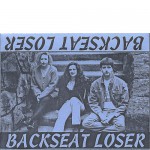 Backseat Loser
Backseat Loser
Backseat Loser
Self-Produced
Here’s a band with a bit of a pedigree. Backseat Loser bassist/ vocalist Laura O’Donnell was a founding member of the Obituaries. And this band bears a certain stylistic kinship. The music is dark and foreboding without being as heavy as that of the Obituaries.
Neither Laura nor guitarist/vocalist Christine Upchuck are of a caliber of Monica Nelson as a singer. But that does not prevent this energetic three-piece band from creating a certain gothic charm of its’ own.
O’Donnell handles the lead vocal chores on “Scorpio,” a schizy little ditty that vacillates between the linearity of the verses and the frenetic pointillism of the choruses– where Christine and Laura play a Zappa-like figure in unison. Christine power chords her way through the verse while Laura blends with drummer Brad Newton for a doom/surf kind of feel.
Christine demonstrates a sense for vocal nuance in the later verses of “Gone Dead.” While she and Laura combine for a slightly flamenco flavored filigree, she displays a middle eastern inflection that works well. Without a true chorus, the song seems suspended, without a resolution. The interesting appendage where a chorus should be, is more of a bridge. But the memorable hook of a chorus is missing here.
Christine’s “All Take No Give,” fares better in this regard. Dangled upon a spiraling guitar riff, the band hit this tune at full speed. Laura adds strong counterpart basslines in support of the lead figure. Though too short, this tune works well.
“Close Your Eyes” hangs on O’Donnell’s bubbling bass before moving into an ethereally murky passage where guitar and bass merge into one thick snake of a sound. While very pleasing as a textural piece, here again the lack of a chorus prevents the song from becoming truly memorable.
The live take of “Arrested” is tighter than the studio stuff. Laura’s voice seems more powerful and the rhythm work is more centered. Still it is Christine’s riff, which resembles George Harrison’s on “I Feel Fine,” that acts as a chorus.
This is a recurring problem for Backseat Loser. While several of their songs have interesting segments– they seem incomplete. Songwriting, in any genre, is a craft that is learned through practice and imitation. I would suggest to the band that they take apart the songs of their favorite bands to see what makes the material successful or satisfying.
Secondarily, the band is somewhat loose around edges. Laura and drummer Newman are often sloppy in their synchronization– an important aspect in the music the band chooses to play. Sometimes the beat seems too fast for the accompaniment. What does the song want?
These problems are not insurmountable. Backseat Loser has plenty of appeal with what they do. But in order to progress, they must dare to venture beyond what is safe or comfortable for them now.
 The Prairie Dogs
The Prairie Dogs
Happy Hour
Self-Produced
A line-up of the usual suspects is responsible for this live recording, captured at the Laurelthirst. Neil Gilpin, Tim Acott, Dan Haley and Randy Givens have played in so many combinations at that club that one would think they had exhausted the possibilities. But here they have gathered to play some laid-back eclectic bluegrass/country/blues originals, traditionals and standards– in the style of David Grisman or Django Reinhardt perhaps.
What you get is well played music. Haley provides the thrills on “Sleepy Time Gal,” with an interesting rock-flavored mandolin solo. Gilpin’s characteristic vocal carries the verses, while Acott provides the drowsy stand-up bass and Givens does the brush dance on the snare. Haley’s harmony vocals liven up the homely strains of “Oceans of Diamonds.”
Gilpin contributes some sassy steel guitar on George Jones’ “Tall Tall Trees.”
A Texas Playboys treatment is given to the standard “I Wish You Love.” The band serves up “House of the Rising Sun” in a major key, rendering it nearly unrecognizable– but ultimately more authentic. Haley’s mandolin stylings seem anachronistic, given the arrangement. A similar dilemma affects “CC Rider,” though to a lesser extent.
Haley’s original, “Cows Come Home,” works well, with Gilpin contributing fine screechy fiddle. Gilpin adds some slick pedal steel to the Hawaiian hula of Haley’s “Makani Love Song.”
The traditional folktune, “Peggy-O,” works well as a weird bluegrass number. Here, Haley’s hard charging vocal delivery is nicely complimented by Gilpin’s antique fiddle phrasings. Haley lends a new arrangement to the old Ed and the Boats chestnut “Jesus Is My Landlord,” with a country-tinged approach that Gilpin colors with moaning steel guitar. Gilpin’s “Sweet Sour” comes off as fairly straight bluegrass.
The Prairie Dogs play music as comfortable as an old pair of shoes. These guys are well-skilled musicians. who can work in a plethora of styles– many of which they exhibit here, sometimes simultaneously. They may not have any new tricks to offer, but they recombine the old tricks they know so as to make them seem new.
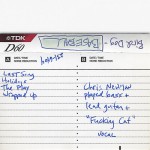 Bird Dog
Bird Dog
Baseball
Self-Produced
Bird Dog returns with four, folk-flavored songs, recorded under the auspices of Chris Newman, who contributes bass and lead electric guitar as well. Bird Dog has lately come onto the scene, adding his hazily poignant voice and thoughtful songs: a budding new talent. Newman’s input helps to give his songs a solid foundation.
The new song “Last Song,” indicates that Bird Dog has been working on his songwriting craft. While the song still doesn’t have a chorus, exactly, it has a repetitive section that is very pretty and quite memorable. Newman’s well-placed guitar washes and fills add tasteful color and texture. The remake of “Holidays” benefits from Newman’s input. A definite tension is created which seems ominously foreboding.
Newman’s spaghetti western guitar sets the mood for the lone and desolate “The Play”– a dark and moody number. Bird Dog’s gauzy voice rises above the jingle jangle of his acoustic guitar– calling to mind Michael Stipe. “Wrapped Up” contends itself with the story of one of life’s forgotten creatures. Bird Dog captures the essence of the scene with the sensitivity of an artist.
Bird Dog seems to be finding his voice. His songwriting is still somewhat unfocused, but the possibilities this young man displays are potent indeed. It will be interesting to watch his progression in the local music community– a musician certainly worth keeping an eye on.
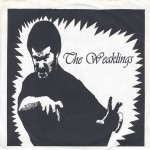 The Weaklings
The Weaklings
“We Blew It”/”Wow Kinda Gal”
Self-Produced
This single doesn’t completely capture it, but live, this is a very charismatic band, fronted by a guy named Bradly– who is, visually, one of the most exciting local performers to be seen since Billy Rancher. The three-piece band that backs him up is ballsy, tight and to the point. No wasted notes, just the straight voltage.
“We Blew It” sounds like the Sex Pistols doing Husker Du material or vice versa. Whatever, it goes by fast and furiously, throwing off sparks like a dragster that’s lost a wheel. Drummer Keith and bassist Scott hold down the AK-47 beat, while guitarist Chris grinds away in the background.
Dynamically, “Wow Kinda Girl” adds a little variety, sliding from quieter, chunky passages in the verses to the blitzkrieg of the choruses– propelled by Keith’s thunderous drumming. The guitar riff sounds like a variation of Zep’s “Living Loving Maid.”
Delicate might not be a word in the Weaklings’ vocabulary, but the hammer they wield hits the nail squarely every time.
Ray Gunn Live
Self-Produced
Gunn is another folky who has developed an arresting, if somewhat sloppy sound. Ray’s vocals on “Justin’s Poem” show a lot of promise, moving from a low croon to an urgent and gritty tenor chortle– with nary a faltering step. Ray knows how to come up with a vocal hook, even if, as in this case, it’s a bit flimsy. It still works, all the same. The rhythm section of Tom on bass and Dave on drums provides steady, if uninventive accompaniment.
“Mary” sort of calls to mind Chris Isaac without sounding too much like him. The cool double time of the vocals over the loping rhythm section creates a sense of tension and movement at the same time. A neat trick. The lyrics concern themselves with young Mary: “Ten days later they found Mary dead/Hung by a lasso over her own head.” Eke! However, this song is in the tradition of countless “tragic young person songs” that range from the insipid (“Patches,” “Billy and Sue”) to the surreal (“Ode To Billie Joe”) to the ridiculous (Noel Harrison’s “To A Young Girl”), that spring up from time to time to serve as our modern day morality plays. In that respect “Mary: mostly succeeds. She very well could be that young girl of whom Noel Harrison once sang.
The memorable chorus of “Highway Freedom” overcomes the “jammin’ in the living room” feel of the song. Ray’s impassioned vocals carry it over it’s mechanical imperfections.
This is all pretty simple stuff. But the meaningful moments are frequent enough as to transform the material– elevating it from mundanity to a kind of unassuming sublimity. It could grow on you. Ray Gunn would have better fortune, though, if he were to sharpen his skills a bit more and focus his aim on a more precisely detailed target. He has the tools to one day hit the mark.
——————————————————————————-
the Vultures
Live Review
Pity the poor fool band that has to follow the Vultures. They are an all-star band fronted by the notorious “Fat Matt” McCourt. McCourt, perhaps best known as lead singer in Wild Dogs, has joined forces with former Voodoo Dolls– guitarist Leslie Karlson and bassist Jeannine Dawson to form a supergroup, the likes of which Portland has never seen.
And McCourt has never been in finer form. A recent show at Mt. Tabor Theatre & Pub found him delighting the audience with witty asides, dirty jokes and other assorted foolery, while pacing this red-hot band through a clever set of memorable original tunes. Their sound is fast, furious and as tight as a motor mount.
McCourt proves that he is still Portland’s consummate showman, demanding the audience’s complete attention– despite the presence of lovely Leslie and muscular Jeannine. Check out tunes such as “I’m Watchin’ The Game,” “Ernie The Meatwagon Driver,” and “Cum Junkie” for an idea of what the Vultures bring to the party: a self-deprecating sense of humor unseen in rock since the advent of grunge.

